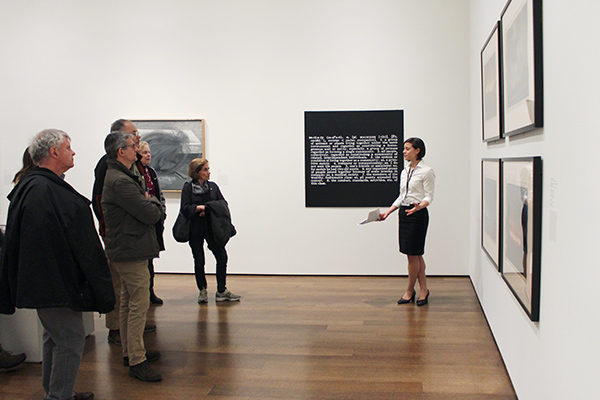Harvard Art Museums’ gallery talks are designed to be a quick but focused look at a single object or a select group of works on view. Led by curators, curatorial fellows, conservators, and other experts, the talks are included with the price of admission, and most occur from 12:30 to 1pm—perfect for stopping by on a lunch break. Sometimes, however, the conversation takes a bit longer.
“I could say so much more about these works,” said Miriam Stewart, as she invited her audience to look at another of the museums’ Pre-Raphaelite paintings. Stewart, who is curator of the collection in the Division of European and American Art, stuck around for a few minutes to answer questions after her talk about Pre-Raphaelite artists, poetry, and the artists’ patrons (and their resulting paintings and drawings). “The subject was inspired by the labels that I wrote for a recent rotation in the gallery, and I was happy to have a chance to share some serendipitous connections between the paintings and drawings on display,” Stewart said. “I find that the interest of the visitors really energizes me, and I very much enjoy our interactions.”
A key component of the Harvard Art Museums’ programming for the past two years, gallery talks like Stewart’s occur at least once a week, and are meant to highlight the rich and diverse collection of objects on view. (Taking one of our regularly scheduled student guide tours, which are led by Harvard undergraduates, is another way to learn more about our collections.) Gallery talks focus on both intellectual and practical considerations, exploring not only the themes at play in a gallery but also various aspects of the installation process. Subjects range from ancient Egyptian mummies, to medieval stained glass, to 21st-century sculpture.
Some talks are presented as part of a larger series. For example, a recent set of talks has been designed to coincide with the first 100 days of the new U.S. administration; the series tackles such topics as political power and activism, art and resistance, global citizenship, and the role of the arts over time—themes that are considered through close looking at works from across the collections and from around the world.
During one such talk, Ethan Lasser, the head of the Division of European and American Art and the Theodore E. Stebbins Jr. Curator of American Art, discussed the museums’ presidential portraits, including two different paintings of George Washington, by Charles Willson Peale and Gilbert Stuart. Lasser and his audience contrasted the compositions, as well as the implications of each type of portrayal. In concluding, Lasser encouraged visitors to think about how presidents’ likenesses have been presented and reproduced throughout history and to apply that sensibility to contemporary images they encounter.
Other series have been united by a focus on a particular medium or technique, such as the monthly talks about prints recently offered by Elizabeth Rudy, the Carl A. Weyerhaeuser Associate Curator of Prints. Still others have centered on a key work—such as Winslow Homer’s Summer Night (1890), on loan from the Musée d’Orsay in Paris—or on exhibitions, including Drawing: The Invention of a Modern Medium (January 21–May 7, 2017).
Not all talks focus on art; one popular and long-running talk covers the museums’ eight-year expansion and architectural renovation. This special one-hour discussion is led by Peter Atkinson, director of facilities planning and management. People who attend seem to be fascinated to learn more about the building, Atkinson said. The curiosity sparked by the talk often draws visitors further into the building—and, in turn, into the museums’ remarkable collections.
To find the next gallery talk, visit our calendar. Gallery talks are free with museums admission. Because each talk is limited to 15 people, tickets are required. Tickets will become available at the admissions desk 10 minutes before the start of each talk.


